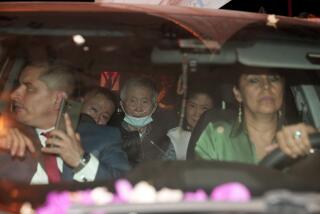Egypt braces for release of Hosni Mubarak
CAIRO — Even frail and dressed in prison whites, Hosni Mubarak had a few moves left.
A court ordered the former Egyptian president freed from jail Wednesday in a stunning turn of fortunes that highlights the prospect that his old guard is reemerging from the bloodshed and political unrest that has followed the 2011 revolution. That uprising was supposed to have undone the man Egyptians called the Pharaoh.
But Mubarak’s release from Tora prison, expected Thursday, is a blow to efforts to build a democracy after decades of corruption and repression. With the military back in control after its deadly battle against the Muslim Brotherhood, the remnants of Mubarak’s 30-year-old police state are again edging toward power.
Critics and supporters of Mubarak had expected his release. However, most leaders of the Brotherhood are now under arrest and its members are unable to organize protests. Liberal activists who helped oust Mubarak and then backed the military against the Brotherhood will see Mubarak’s release as evidence that their revolution has been hijacked.
Much of the rest of the nation has moved beyond the intrigue of Mubarak’s legal saga. Unemployment, economic turmoil and persistent political divisions have been the focus of much attention. In many ways, with legions of police in the streets and dissent quickly muffled, it is as if the 2011 revolution never happened.
The 85-year-old former leader’s legal victory laid bare the tawdriness of his rule. The case the judges set aside involved about $4 million in “gifts” Mubarak received from Al Ahram, the state-run news organization. It was the last docket prosecutors could hold him on; time limits on other cases had expired.
A judicial source said prosecutors were not planning to appeal. It did not appear likely that investigators would bring new charges. In an attempt to anticipate the outrage, the military ordered that Mubarak be placed under house arrest upon his release.
Mubarak, lately glimpsed only peering from behind sunglasses in a defendant’s cage, still is being retried on charges related to the killings of more than 800 protesters during the uprising against him. He is essentially on bail, a man with a voided passport and seized foreign bank accounts.
The latest twist comes amid a surge of nationalism that has swept Egypt since last month’s coup ousted Islamist President Mohamed Morsi and the Brotherhood. Morsi is also in detention and Mubarak’s release is certain to further infuriate Brotherhood followers. More than 900 Morsi supporters and anti-military protesters have been killed by security forces in the last week.
Liberals, including the youth group known as Rebel, are now calling for new protests. They sense, after cheering generals who took down Morsi, that the army and security forces are tilting Egypt toward the authoritarianism of the Mubarak order.
Rebel will not “stand and watch the killers of martyrs get acquitted, for if today Mubarak is acquitted, then tomorrow Morsi will be acquitted,” the group said in a statement. It urged the military to use “any legal mean under emergency law because [Mubarak’s] release represents a threat to national security.”
Mona Ezzat, a math teacher who protested against Mubarak in Tahrir Square in 2011, said that if he is released, it “means the revolution was for nothing.”
“I’m angry because exacting justice from Mubarak was one of the few things keeping the Jan. 25 spirit alive,” she said.
Mubarak was the quintessential Arab strongman, a former air force general with dyed-black hair, a plotting wife, an ambitious son and an aloof, at times inscrutable, demeanor. His image loomed from billboards and mosaics, like a father’s eyes peeking into the lives that, except for his cronies, he was unable to improve amid deepening economic turmoil.
Even Gen. Abdel Fattah Sisi, commander of the armed forces, has mimicked Mubarak’s script. Mubarak arrested, tortured and persecuted thousands of Muslim Brotherhood members, calling them terrorists. In addition to the hundreds of Morsi supporters killed, Sisi has jailed more than 1,000 Brotherhood followers, including most of the group’s leaders, and frequently refers to them as terrorists.
Mubarak’s loyalists weathered his downfall and were buffered by the military rule that followed for 17 months until Morsi was elected last year. Morsi moved to purge Mubarak’s networks in the Interior Ministry and other agencies but was outmaneuvered by a resurgent army that won support from liberals and activists who once condemned it.
Those who backed Mubarak for decades felt vindicated by the court’s decision.
“Truth eventually surfaces and we knew that the truth about Mubarak would come out and that he would be released,” said Ashraf Ashmawy, an organizer of pro-Mubarak rallies. “He ruled this country for a long time, and kept it safe, and prevented us from going into any wars. How can we try someone like that? People who wanted him on trial are traitors and people who hate this country.”
Despite years of crumbling institutions and the reality that more than 40% of Egyptians lived on $2 a day or less, many still regard Mubarak as a hero.
“President Mubarak was the best president of Egypt. Look where the country is now after he was removed from power,” said Mohammad Noury, who like Ashmawy marched to support Mubarak during his final days in office. “He had to be released because he is not guilty.”
He added: “Mubarak is an old and sick man and he doesn’t deserve to be in prison at this time. He doesn’t deserve to go through all of this. This is the right thing.”
Special correspondent Ingy Hassieb contributed to this report.
More to Read
Sign up for Essential California
The most important California stories and recommendations in your inbox every morning.
You may occasionally receive promotional content from the Los Angeles Times.











